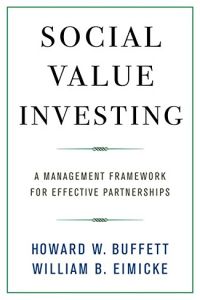Join getAbstract to access the summary!

Join getAbstract to access the summary!
Howard W. Buffett and William Eimicke
Social Value Investing
A Management Framework for Effective Partnerships
Columbia UP, 2018
What's inside?
Businesses, governments and nonprofits can band together to solve thorny social problems.
Recommendation
The time is ripe for cross-sector partnerships that bring together businesses, governments and nonprofits to solve thorny social problems. So say professors Howard W. Buffett and William B. Eimicke in this incisive look at how “social value investing” unites private-sector metrics and procedures with public-sector projects and goals. The authors lay out detailed studies of successful examples that include India’s introduction of crime-proof identity cards and the rescue of New York City’s Central Park. Activists, students and investors will appreciate this roadmap for collaboration.
Summary
About the Authors
Howard W. Buffett is an associate professor at Columbia University. William B. Eimicke is a professor at Columbia’s School of International and Public Affairs.




















Comment on this summary